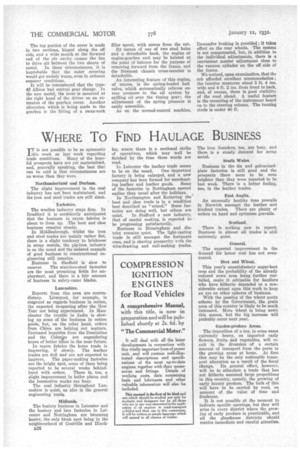WHERE To FIND HAULAGE BUSINESS I T is not possible to
Page 44

If you've noticed an error in this article please click here to report it so we can fix it.
be so optimistic this week as last week regarding trade conditions. Many of the hopeful prospects have not yet materialized, and, generally speaking, the best that can be said is that circumstances are no worse than they were.
Northumberland and Durham. The slight improvement in the coal industry has not been maintained, and the iron and steel trades are still slack.
Yorkshire.
The woollen industry stays firm. In Bradford it is confidently anticipated that the business in rayon fabrics is about to liven up. The boot and shoe business remains steady.
In Middlesbrough, whilst the iron and steel trades are mainly rather flat, there is a slight tendency to briskness in scrap metals, the pig-iron industry is on the mend and the isolated example of good business in constructional engineering still remains.
Business in Sheffield is slow to recover. The stainless-steel factories are the most promising fields for employMent, and there is a fair amount of business in safety-razor blades.
Lancashire.
Reports from this area are contradictory. Liverpool, for example, is stagnant as regards business in cotton, the expected re-opening after the New Year not being experienced. In Manchester the trouble in India is slowing up some of the business in cotton goods, but, on the other hand, orders from China are helping out matters. Increased inquiries from the Dominions and the Colonies are engendering hopes of better tifiles in the near future.
In rayon fabrics the home trade is improving, if slowly. The leather trades are dull and are not expected to improve. The paper-making factories are the bright spot, some of them being reported to be several weeks behind hand with orders. There is, too, a slight improvement in boiler plates and the locomotive works are busy.
The coal industry throughout Lancashire is quiet, as also is the general engineering trade.
Midlands.
The hosiery business in Leicester and the hosiery and lace factories in Leicester and Nottingham are becoming busier, the only bleak spot being in the neighbourhood of Coalville and Llinck B26
by, where there is a sectional strike of operatives, which may well be finished by the time these words are read.
In Leicester the leather trade seems to be on the mend. One important factory is being enlarged, and a new company has been formed for merchanting leather and leather goods. Some of the factories in Nottingham opened earlier than usual after the holidays.
In Northampton and Kettering the boot and shoe trade is in a condition best described as "mixed." Some factories are doing well, but others are quiet. In Stafford a new industry, that of sandal making, is reported to be progressing satisfactorily.
Business in Birmingham and district remains quiet. The light-casting trade is still amongst the fortunate ones, and is sharing prosperity with the wire-drawing and nail-making trades. The iron founders, too, are busy, and there is a steady demand for scrap metal.
South Wales.
Business in the tin and galvanizedplate factories is still good and the prospects there seem to be even brighter than they were reported to be last week. There is a better feeling, too, in the leather trades.
East Anglia.
An unusually healthy tone prevails in Norwich amongst the leather and kindred trades. There are plenty of orders on hand and optimism prevails.
Scotland.
There is nothing new to report. Business in almost all trades is still extremely quiet.
General.
The expected improvement in the demand for house coal has not eventuated.
Beet and Wheat.
This year's unsatisfactory sugar-beet crap and the probability of the already reduced sown area being further curtailed, make it advisable for hauliers who have hitherto depended to a considerable extent upon this work to keep an eye on other spheres of business.
With the passing of the wheat quota scheme by the Government, the grain area of this country is likely to be much increased. More wheat is being sown this season, but the big increase will probably occur next year.
Garden-produce Areas.
The imposition of a tax, in some cases extremely heavy, on imparted early flowers, fruits and vegetables, will result in the diversion of a certain amount of transport from the ports to the growing areas at home. At first this may be the only noticeable transport alteration as a result of the fiscal change. Its general effect, however, will be to stimulate a trade that has not hitherto assumed large proportions in this country, namely, the growing of early luxury produce. The bulk of this will have to be carried by road, on account of the value of time and freshness.
It fa not possible at the moment to indicate specific openings, but they will arise in every district where the growing of early produce is practicable, and all the glasshouse districts should receive immediate and careful attention.




































































































